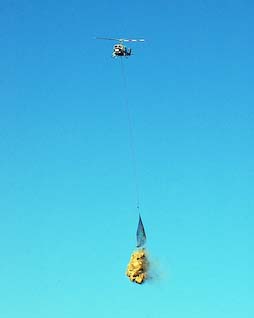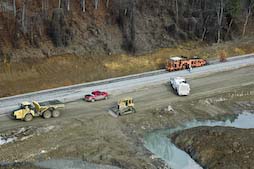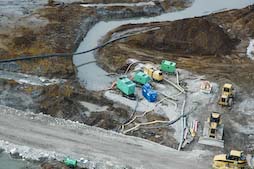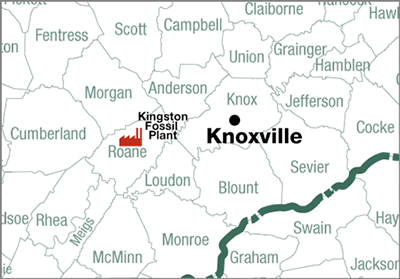Kingston Ash Slide Update
Updated January 17, 2009 – 3:10 p.m. EST
TVA, local, state and federal agencies continue to work on recovery and clean up of a release of ash caused by a failure of a coal ash containment dike at TVA’s Kingston Fossil Plant in East Tennessee. Read more in the fact sheet. (PDF, 1.69 mb)
Updated Air Sample Results
More than 2,600 mobile air monitoring samples have been collected. All sample results have been within the National Ambient Air Quality Standards for Particulate Matter. View the latest information.
Organization Transitioning to Recovery
Local, state and federal agencies responding to the coal ash release at the Kingston plant have transitioned to a recovery project organization with continued state oversight. The transition marks progress in the initial phases of cleanup at the site, and plans are in place to guide the ongoing efforts.
The recovery efforts have continued without interruption.
The recovery project center will be located in a temporary facility on the plant site close to the ash storage area. The EPA and TDEC will continue to have staff at the site to carry on their oversight and independent sampling activities.
TVA has opened a local information center to assist media at 2919 Roane State Highway, Harriman, (865) 590-7001. The local information center will be open weekdays from 8:30 a.m. to 5 p.m.
TVA will continue to assist affected citizens through the outreach teams working directly with families and the staff working at the Outreach Center at 509 North Kentucky Street in Kingston. Phone numbers for the outreach center are (865) 632-1700 or (800) 257-2675.
Water Sampling
USEPA Region 4, Tennessee Department of Environment and Conservation(TDEC), and TVA crews have been conducting water sampling and assessing water quality of public drinking water supplies, private wells, instream river water (both near the slide and at multiple downstream locations) as well as local springs. See the results of sampling through January 6, 2009. (PDF)
As of 1/6/09, TVA has taken more than 150 water samples, TDEC has taken more than 70 samples, and EPA has taken at least 44 samples since the incident.
In addition, TVA has taken more than 170 instream indicator readings of pH, dissolved oxygen, and conductivity. TDEC has also taken more than 25 such instream indicator readings. View the latest water testing results.
Untreated river water samples closest to the Kingston water treatment plant continue to meet requirements for primary drinking water standards.
All EPA, TDEC and TVA water treatment plant sampling results indicate municipal drinking water continues to be safe. Each agency is using certified labs for the analysis. Water samples have been tested from four local water treatment facilities, Rockwood, Harriman, Cumberland and Kingston.
TDEC is sampling the Kingston and Rockwood Water Plant intakes and processed water through mid-January. These samples will be taken daily and analyzed for Safe Drinking Water Act standards. The analysis will be performed by the Tennessee Department of Health Laboratory in Nashville. The laboratory data is released by TDEC.
To date, TDEC has sampled more than 50 private groundwater wells within a four mile radius of the plant. All sample results were within safe drinking water standards. Those members of the public within this vicinity who desire to have their drinking water ground wells tested should call (865) 594-6035 to schedule.
TVA is collecting river water samples on a Monday- Wednesday-Friday schedule to track ash content over time and in various locations.
Environment and Public Works Committee Testimony
Tom Kilgore, President and Chief Executive Officer of the Tennessee Valley Authority testified before the Environment and Public Works Committee on January 8, 2009. Documents related to that testimony are listed below:
Health Assessment Survey
Tennessee Department of Health, with assistance from Center for Disease Control and Prevention (CDC), performed a brief health assessment of people living in the affected area. Health Department and CDC staff conducted the assessment by going door-to-door and asking routine health survey questions.
Community Outreach
The Community Outreach Center at 509 North Kentucky Street in Kingston is now open from Noon to 7 pm Monday through Saturday and 1 pm to 5 pm on Sunday. The local phone number for the Outreach Center is (865) 632-1700. If residents are unable to come to the center, they can call (800) 257-2675 to report their claims.
Residential outreach teams continue to call on 40 - 60 families daily, and business outreach teams are calling on businesses across the county to address questions and concerns.
Anyone requesting well water sampling should call the Tennessee Department of Environment and Conservation (TDEC) at (865) 594-6035.
All other members of the public should continue to use (865) 717-4006 with their questions or concerns.
Cenospheres Collected
The residue floating on top of the water is called cenospheres.
Cenospheres are inert, hollow balls of sand-like material. Cenospheres are created in a coal-fired boiler when molten ash solidifies around a bubble of flue gas to form a hollow sphere. The gas bubble allows cenospheres to be so lightweight that the particles float on water and are typically collected by skimming the surface of an ash pond.
About 24 tons of cenospheres have been collected to date.
Read more on the fact sheet. (PDF, 102 kb)
Radioactivity in Ash Samples Not a Problem
Ash samples, as well as a sample of soil from an unaffected area, were taken on December 29 and 30 in the Kingston area and analyzed for radioactivity. The final analysis confirms the conclusion that the radioactive material present is mostly naturally occurring and is similar to what we would normally find in soil in the Tennessee Valley area. It is also representative of what would be expected in coal ash.
Read more in the fact sheet. (PDF, 71 kb)
Airborne Ash Dust Control
 Seeding of the ash with temporary grass and mulch is complete.
Seeding of the ash with temporary grass and mulch is complete.
This is a temporary measure for controlling dust and erosion. Long term recovery efforts will continue. For more information, please see the ash dust control fact sheet.
The undisturbed portion of the ash cell is being treated with a liquid dust suppression agent via truck and sprayer. The internal portion of the spilled material has been sprayed with seed and fertilizer, followed by straw. To provide temporary ground cover, TVA seeded, fertilized, and mulched about 213 total acres of exposed ash using a helicopter. More than 85 tons of grass seed and fertilizer were used. For areas that can not be easily accessed by air, TVA is using an amphibious vehicle to apply dust suppression materials. This will be applied manually from an amphibious vehicle in order to protect property and possessions. This process is similar to the one used by highway departments to provide ground cover.
For the area around Swan Pond Road where work is continuing, the ash will be sprayed with water.
The ash is mostly inert and breathing fly ash for a short period of time is unlikely to be a health concern. Breathing particulates (fly ash or other airborne particulates) over long periods of time can irritate the respiratory system. TVA is taking measures to reduce the amount of airborne dust that may arise in the future.
Roadway and Railway Cleanup
 Public access on Swan Pond Road past the Kingston plant and Swan Pond Circle remain closed except for construction as TVA removes material off the roads. Safety is the priority for anyone entering the area. Currently, there is no estimate for when the road will reopen for public use.
Public access on Swan Pond Road past the Kingston plant and Swan Pond Circle remain closed except for construction as TVA removes material off the roads. Safety is the priority for anyone entering the area. Currently, there is no estimate for when the road will reopen for public use.
Construction of the rail lines damaged by the ash is complete. 2114 feet of railway was replaced.
Solids/Ash Sampling
Preliminary testing of the offsite soil samples show that toxic metals are well below (on the order of 10–100 times) the limits for classification as a hazardous waste. The trace concentrations of toxic metals in the offsite material sampled are consistent with and generally lower than that of the historic sampling results from the ash dredge cell that collapsed. The data shows that the concentrations of most metals in the deposited ash are not dramatically different from concentrations found in natural, non-agricultural soils in Tennessee, with the exception of arsenic. Total arsenic results were above the average naturally occurring, but well below levels found in soils that are well fertilized and significantly below the limits to be classifies as a hazardous waste. The latest Solids/Ash testing results can be viewed here.
Emory and Clinch Rivers
The Emory River remains closed from mile marker zero through mile marker 4. The Kingston Fossil Plant Boat Ramp and fishing area have also been closed due to large equipment being moved into the area for clean-up. Coast Guard and TVA Police marine units are assisting with security in the area.
 Work is complete on a rock weir built on the Emory River, just north of the existing intake skimmer weir. The weir is about 615 feet long. The weir will allow water to continue flowing, but will contain the ash. TVA is coordinating with the Corps of Engineers for environmental permitting related to the work.
Work is complete on a rock weir built on the Emory River, just north of the existing intake skimmer weir. The weir is about 615 feet long. The weir will allow water to continue flowing, but will contain the ash. TVA is coordinating with the Corps of Engineers for environmental permitting related to the work.
Construction of the second weir designed to confine the ash and keep it from entering the river during the river dredging process is suspended until the Swan Pond Circle roadway is rebuilt so that trucks hauling material to the weir will not be traveling in the nearby community.
Kingston Fossil Plant
Kingston Fossil Plant is located at the confluence of the Emory and Clinch Rivers near Kingston, Tennessee.
-
Kingston is one of TVA’s larger fossil plants. It generates 10 billion kilowatt-hours of electricity a year, enough to supply the needs of about 670,000 homes in the Tennessee Valley.
-
Plant construction began in 1951 and was completed in 1955.

For more information about Kingston fossil plant, please visit the Kingston overview page.